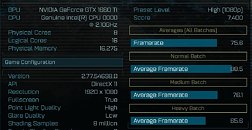Tuesday, January 22nd 2019

NVIDIA GeForce GTX 1660 Ti Put Through AoTS, About 16% Faster Than GTX 1060
Thai PC enthusiast TUM Apisak posted a screenshot of an alleged GeForce GTX 1660 Ti Ashes of the Singularity (AoTS) benchmark. The GTX 1660 Ti, if you'll recall, is an upcoming graphics card based on the TU116 silicon, which is a derivative of the "Turing" architecture but with a lack of real-time raytracing capabilities. Tested on a machine powered by an Intel Core i9-9900K processor, the AoTS benchmark was set to run at 1080p and DirectX 11. At this resolution, the GTX 1660 Ti returned a score of 7,400 points, which roughly compares with the previous-generation GTX 1070, and is about 16-17 percent faster than the GTX 1060 6 GB. NVIDIA is expected to launch the GTX 1660 Ti some time in Spring-Summer, 2019, as a sub-$300 successor to the GTX 1060 series.
Source:
TUM_APISAK (Twitter)

155 Comments on NVIDIA GeForce GTX 1660 Ti Put Through AoTS, About 16% Faster Than GTX 1060
Apologies if I jumped in!
NEXT
Yes, materials and workforce are becoming more expensive, but it simply means you have to make a slightly simpler product. Thanks to general technology improvement it will still be faster.
In other words: for each cost c above some minimal c_0 you can make an optimal GPU (i.e. fastest possible at cost c). Same goes for CPU.
And we know this minimal c_0 is tiny (you can buy "a PC" for $5 these days :-)).
Nvidia obviously doesn't have to increase prices to offer a better GPU than before. They do it, because they can.
I would get an RX 570 8GB instead of that shitty VRAM limited stuttery mess RTX 2060. [Sarcasm]
But the problem is that shitty VRAM limited stuttery mess RTX 2060 is faster than all mid-range cards (including Vega 56 and 1070Ti) with 8GB of VRAM at 1440p, so what to do?
Performance, stuttering in particular, is the indicator of insufficient memory.
The minimum framerate on the 2060 at 1440p is significantly lower than on vega 56 which is slower on average.
I believe it's VRAM related because Wolfenstein 2 is extremely VRAM hungry in general and is literally unplayable on a 4GB card at 1440p on max settings.
People that buy GPUs want them either for gaming or for work. I hope we don't have to discuss the latter. And is gaming a "luxurious" hobby now? Really?
And while this is quite fun, where are you going with this? That you have a lot of money to spend on your PC and you don't care about poorer fellows?
The 2060 has more performance at an MSRP of $350 than the 1070 at an MSRP of $370. The ridiculous idea that it should be priced at 1060 tier is something you made up in your head.
You want a cheaper GPU? Buy a 10 or 9 series, the fact that you feel entitled to the latest part at whatever price you want is ludicrous.
You know like 70~100% increase per gen like it used to, instead of the 25~30% we got with Turing.
So if you define a gaming GPU not as a luxury, maybe that is a definition of 'entitlement', then.You're spot on. The endless complaining about price is not only pointless its also a bit sad. Yes its a lot of money, so either save up longer, or don't buy it... There is always going to be some item one might want that is priced out of reach.
Bending Over Backward Chronicles: Aggressive Nonsense.
Stagnant perf/$ and ever raising prices is not "a problem", but a fact.
If you have problems when people state it, perhaps you should try to figure, why.
There's only one decent definition of something being "a luxury" - that's "luxury goods" in economics. Simply put: these are things that you want more as they become more expensive (like collectables, art, jewelry etc).
Everything else is colloquial and varies from dictionary to dictionary (and from person to person).
There's no way to create a good definition of "luxury" the way you want. There's no objective condition, so you quickly end up with everything or nothing being luxurious. :-)I never said that. I said there's a need for a cheaper card.
You should concentrate more on reading and less on imagining new world order. :-)I can't buy a 9-series anymore and 10 will also disappear when cheaper 16/20-series arrive.
So what's your solution?
As I said: AMD does what you say - they release a high-end model and keep refreshing it in following years with lower prices. But we end up with inefficient cards (power-hungry, hot and noisy). Customers clearly prefer what Nvidia has been doing.
Moreover, GPU is more than just performance and efficiency. It's also about other technologies - like output standards, CUDA compatibility, supported hardware encoding etc. That's why refreshing (and updating these things) makes more sense than just selling the same card for 6 years.Which gets as back to what I said: using your definition, the only non-luxury products are those our organism needs to function: water, food, oxygen etc.
But since these can be found for free in the wild, is everything you have to pay for a luxury?If you base this on a definition that "luxury" is something you can live without, isn't any kind of gaming a luxury?
Are some people on this forum so elitist and arrogant that they need recognition for owning expensive hardware? :-D